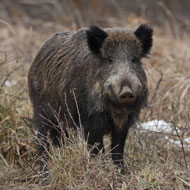African swine fever 'spreading slowly'

African swine fever was identified in Lithuania and eastern Poland in early 2014, and subsequently in Latvia and Estonia.
African swine fever is ‘spreading slowly’ in the Baltic countries and Poland, according to a new report by the European Food Safety Authority (EFSA).
The latest epidemiological data shows the disease is spreading at a rate of around 2km a month in Latvia and Estonia, and 1km a month in Lithuania and Poland.
In addition, the number of infected animals found among hunted wild boar is very low (up to three per cent). Therefore, the outbreaks in the Baltic countries and Poland can be defined as a ‘small-scale epidemic’, EFSA said.
African swine fever was identified in Lithuania and eastern Poland in early 2014, and subsequently in Latvia and Estonia. No additional member states have reported cases since then.
Andrea Gervelmeyer, a veterinary epidemiologist at EFSA, commented: “This report is the outcome of a fruitful cooperation with Member States. We look forward to continuing investigations on this disease, which has serious socio-economic consequences in affected countries.”
A second report will be published in autumn 2017, providing updated analysis and a review of the management options for wild boar.



 The Veterinary Medicines Directorate (VMD) is inviting applications from veterinary students to attend a one-week extramural studies (EMS) placement in July 2026.
The Veterinary Medicines Directorate (VMD) is inviting applications from veterinary students to attend a one-week extramural studies (EMS) placement in July 2026.